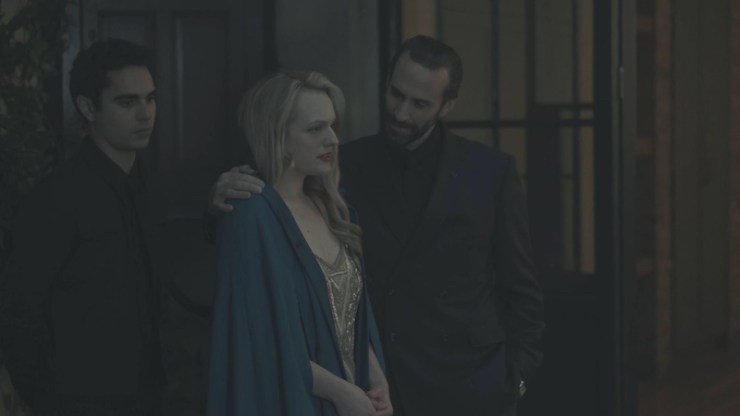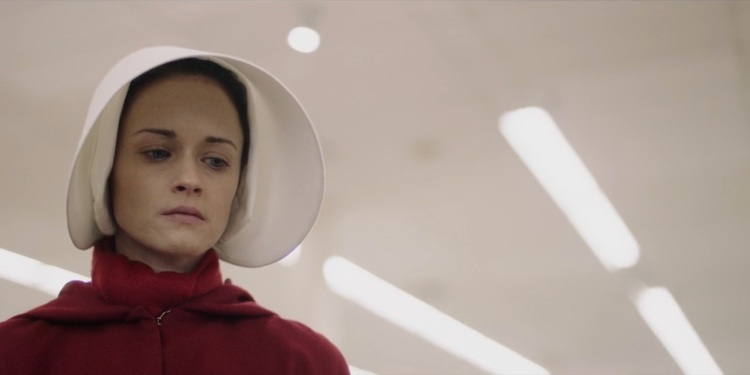I recently finished my second watch of Hulu’s TV series adaptation of The Handmaid’s Tale. I’ve been a fan of the book since I read it as a teenager, and it’s something that’s stayed with me; “nolite te bastardes carborundorum” was a phrase that helped me through the bleak aftermath of Trump’s election last year. It’s a book that’s all about the way that the system can grind you down, but unlike something like 1984, seems to suggest that there’s always room for hope. The TV show takes this even further, illuminating the various small victories the main character Offred (Elisabeth Moss) achieves in a way the book can’t: in her smug smirk as she walks away from the house, and especially, in its choice of music in those moments.
The Handmaid’s Tale has been lauded as well-shot, well-written and well-acted, but one place where critics haven’t been so kind is its choice of music. Mostly the point is that it’s “too obvious,” and kind of cheapens the impact when a show all about The Patriarchy ends with the classic feminist anthem Lesley Gore’s “You Don’t Own Me” (1963). The one that made me roll my eyes was Tom Petty & The Heartbreakers’ “American Girl” (1977) over the season finale’s end credits, which to me mocked the ambiguity of the episode’s ending (similar to the book’s). There’s also “White Rabbit” (1967) by the Jefferson Airplane, a song I love and have sung at many a Rock Band or karaoke night, being used when Offred first enters Jezebels, the secret Playboyesque “gentlemen’s club” for government officials and foreign dignitaries. Along with it being on-the-nose for a descent into a den of sin, the song’s more about drugs than sex–the primary thing Jezebels has on offer.

Overall, though, I’m more positive about The Handmaid’s Tale’s music than a lot of critics. I was less so on re-watch, where I could see it all coming, but I still didn’t find them as jarring as I felt like I should. That surprised me. I’m generally someone who likes musical choices to shock me, or at least give me something to think about–not just to go where I expect them to go. I bring it up a lot with my favorite example of “it’s more about how you use music in film than the music itself”: Forrest Gump. I love the ’60s rock music that fills its soundtrack, but not when it’s spitting back like a parrot the actions or dialogue we just saw/heard. (Granted, I have a ton of other issues with that film, too, but the music is one of the most glaring.) For more on that, see this essay. Going back to The Handmaid’s Tale, it helped me illuminate where obviousness works–and doesn’t–in film music.
I think there are three primary ways to use it. The one that most clearly applies to The Handmaid’s Tale is catharsis. The Handmaid’s Tale is a brutal show, and it throws you into the deep end of this deeply misogynistic, homophobic, and otherwise cruel world and asks you to understand why the characters have come to view this as normal. While we’re spared moments like Janine’s (Madeline Brewer) eye-gouging, we see others, like the cattle prods used on disobedient Handmaids, or when a man gets his hand cut off as punishment for adultery. And sometimes the implications are all you need, as in Ofglen’s (Alexis Bledel) horrifying fate at the end of episode 3 (that I’m not going to describe because you should go in as cold as possible if you haven’t seen it yet). The really obvious pop music cues seem designed to confirm our horror. While the Handmaids’ retainer Aunt Lydia insists that this is the new normal, and the Handmaids and Jezebels seem to have adapted to varying degrees, the music reminds us that we don’t have to accept that. We aren’t in that world. In the case of “You Don’t Own Me” it does that very directly, but with something like “American Girl” it’s a more subtle reminder reawakening us to the real world we live in–particularly given that the America of the title no longer exists, replaced by Gilead. (in that sense, it’s reminiscent of the use of Beethoven 5 in the penultimate episode of Fullmetal Alchemist (2003), an aural cue that we’ve crossed over the gate into the Real World.) Overall, the effect is emotional catharsis that reminds us that the show is on our side, even if its characters and world are not.

A second place where obviousness is justified is when the message needs to be that obvious, when the possibility that some viewers won’t get it is more troubling than it coming off too preachy. An example of this is LGBT romantic arcs that use cliché romantic music cues that might come across as “schmaltzy” when applied to a heterosexual couple, but it needs to be done so the more obtuse viewers aren’t confused–especially if the creators are restricted in what they can convey through visuals or dialogue. (The best recent example of this is Yuri!!! on Ice, but this shows up in Western media, too, from Buffy the Vampire Slayer to Glee.) One could make an argument that The Handmaid’s Tale does this with the ending of episode 3, where Ofglen’s scream dissolves into Jay Reatard’s furious “Waiting for Something” (2006), which extends and validates her anger. I’d say this is closer to “catharsis,” but it could be that some of why it’s such a horrific fate could be lost to viewers who don’t share her anatomy. The musical framing–along with the sound of her scream–makes that much clearer, as it needs to be.
The last one is camp, which doesn’t apply to this show except that some of its sloppier musical choices can unintentionally come off that way. (The triumphant instrumental music at the end of episode 4, with June’s line “We are Handmaids. Nolite te bastardes carborundorum, bitches,” falls into this for me, especially with how the framing seems to suggest she’s found some power in being a Handmaid. She hasn’t–not yet, at least–and it cheapens the smallness and hollowness of the victories she has achieved.) But The Obvious–pointing it out and then stretching it as far as it will go–is at the heart of camp, and the music should follow suit.

Perhaps why this all comes off as so jarring in The Handmaid’s Tale is that the show prefers subtlety in its visual language. As Anne Helen Petersen put it in this excellent piece for Buzzfeed, it’s full of the “female glance”: the camera often briefly considers something and then flits away, with no dialogue to explain that choice, leaving the viewer to consider it in a similar way to the characters. It directly follows certain characters’ (mainly Offred’s) line of sight much of the time, another decision fraught with ambiguity: are we just following the character or is there still a reason for the camera focusing the way it is? And why in this moment?
Yet the sound-world of The Handmaid’s Tale is never this careful or subtle–and I don’t just mean in terms of the music. The dialogue also interrupts the carefully cloistered world of Gilead, filled as it is with June’s inner monologue, with Handmaids and other women breaking decorum with each other into swear words that would be otherwise forbidden. Taken together with the music, it forms a strange sort of audiovisual counterpoint, where it’s less that they disagree with each other than take wildly different approaches to get there. Whether that division ultimately works is up to you.
Anyway, hello again. Long time no see! I’ve decided to finally go back to using my blog, after a long hiatus. I’m not done talking about anime–I have several anime-themed posts planned for the near future, in fact–but I’ve been watching more non-anime television and film this year, so I’ll be posting more about those than I previously did. A lot of these will also be shorter, quicker takes, which I hope is cool! Please let me know what you think in the comments, if you’re still reading.